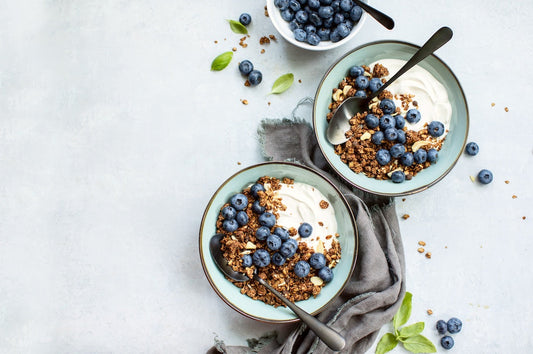Our body and a healthy diet cannot function without nutrients. All of the processes that take place inside our bodies are only possible with the nutrients we need, which is why our organism constantly requires these little helpers in sufficient quantities.
We essentially distinguish between macronutrients (fat, protein, carbohydrates) and micronutrients (vitamins, minerals).
The most important thing in brief:
- Micronutrients do not provide any energy (kcal)
- They are essential for many physiological functions in the human body (cell growth, cell division, renewal of skin, hair, muscles, etc.)
- They are subdivided into vitamins, minerals and trace elements
- A healthy diet is important to avoid a micronutrient deficiency
According to a study 1 by the German Nutrition Society, only 41% of those surveyed meet the minimum recommendation of 250 g of fruit a day and thus ensure an adequate intake of micronutrients.
It is not difficult to get enough micronutrients and keep your body healthy and fit.
What are micronutrients anyway? Which ones exactly and how much of them should you take in ? And which foods are suitable? In this article, we will answer the most important questions about how your body gets its nutrients and show you how you can quickly, easily and deliciously support your cells with micronutrients.
What are micronutrients and macronutrients?
Put simply, macronutrients such as carbohydrates, proteins and fats are the body's energy suppliers, while micronutrients are essential for the body but do not provide energy.
Instead, they have other important tasks to fulfil. For example, they strengthen the immune system, are important for the cardiovascular system and support blood formation and energy metabolism.
Micronutrients include vitamins, minerals and trace elements, as well as phytochemicals, essential fatty acids and amino acids. These substances are vital for our body and protect us, for example, from free radicals. They are therefore important antioxidants. Furthermore, micronutrients are an important building block in the formation of messenger substances in our body.
In contrast to macronutrients, our body cannot produce these vital substances on its own. We must therefore absorb them through food to ensure a functioning metabolism. However, these substances, as diverse as they are, do not provide any energy.
Even though micronutrients do not provide energy, they are needed to build macromolecules or as cofactors for important enzyme reactions.
A balanced diet, exercise and sport are important for the micronutrient requirements of every person, as are growth, pregnancy and old age, but also stress, smoking or illness. An individual and optimal nutrient intake is an important prerequisite for all processes in the body.
| Micronutrients |
| ✓ Vitamins (water-soluble and non-water-soluble): vitamin D (ergo-/cholecalciferol), B vitamins such as vitamin B 5 (pantothenic acid), vitamin B12 (cobalamin), viamin B7 (biotin) ,... |
| ✓ Minerals (inorganic nutrients) divided into: |
| – Quantity elements: calcium, chlorine, potassium, magnesium, sodium, phosphorus, sulfur |
| – Trace elements (essential for humans): iron, iodine, copper, zinc, manganese, molybdenum, selenium, cobalt |
| ✓ Proteinogenic amino acids: isoleucine, leucine, lysine, methionine, phenylalanine, threonine, tryptophan, valine |
| ✓ Omega fatty acids: omega-3 fatty acids, omega-6 fatty acids, omega-9 fatty acids |
So the body does not get any energy from these nutrients – but why do we need them then? This is easily explained: the human organism needs micronutrients for almost all vital functions.
How to start the day healthy – find out more
What are micronutrients and what do they do in the body?
There are a whole host of micronutrients. This means that food contains various micronutrients in different quantities and compositions.
The body's daily requirement of these diverse substances also varies. There are substances that the body needs in larger quantities and others that it only needs in very small concentrations. It can produce some of them itself, while others have to be absorbed from outside, which is also referred to as essential.
The body is able to store some micronutrients for long periods and build up reserves, while it is unable to do so with others. As you can see, these little helpers come in a wide variety. But which ones are actually among the important micronutrients in our body?
The functions of important micronutrients at a glance:
The functions of important micronutrients at a glance:
- Vitamin C and selenium are important for the immune system
- Vitamin B1 supports energy metabolism
- Vitamin B6, B12 and folic acid help to reduce fatigue
- Iron, zinc and iodine support concentration
- Vitamin E and copper protect cells from oxidative stress
- Vitamin A ensures good vision and a strong immune system and plays an important role in reproduction
Vitamins as micronutrient suppliers
Vitamins can be partially self-produced by the human organism, but not in sufficient quantities. Thus, the majority must be supplied through nutrition.
A distinction is made between fat-soluble and water-soluble vitamins, whereby the latter in particular should be regularly supplied, as your body cannot store them.
They support the body in countless metabolic reactions. Their main task is to regulate the utilisation of energy-supplying macronutrients.
Thus, they are directly and indirectly involved in a variety of vital bodily processes. In addition, some vitamins are involved in very specific functions. Therefore, it is important that you ensure an adequate supply of these substances.
Vitamin B6, for example, contributes to a functioning energy metabolism and to the optimal functioning of the nervous system, while vitamin C ensures a strong immune system. Vitamin K also plays an important role in blood clotting.
In general, there are 13 vitamins in our body – 4 fat-soluble and 9 water-soluble – which should always be available in sufficient quantities for a fit organism.
| Fat-soluble vitamins | Water-soluble vitamins |
|---|---|
| Vitamin A (Retinol) | B-complex vitamins – Vitamin B1 (thiamine) – Vitamin B2 (riboflavin) – Vitamin B3 (niacin) – Vitamin B5 (pantothenic acid) – Vitamin B6 (pyridoxine) – Vitamin B7 (biotin) |
| Vitamin D (cholecalciferol) | Vitamin C (ascorbic acid) |
| Vitamin E (Tocopherol) | Folic acid |
| Vitamin K (Phylloquinone) | Vitamin B12 (Cobalamin) |
Minerals
Minerals are essential, which means they can only be obtained from food. They can be categorised as either bulk or trace elements.
Bulk elements include sodium, calcium and magnesium. Calcium is important for healthy bones, while magnesium is essential for muscle function, for example.
While bulk elements occur in increased concentrations in the body, the body stores only a small amount of trace elements. Trace elements include, for example, iron, copper and zinc.
Iron is crucial for red blood cells and the supply of blood, and thus the whole body, with oxygen, while zinc contributes to a stable immune system.
Minerals also fulfil a considerable number of tasks in our organism. They are not only important building blocks of body structures such as bones, but also help to activate enzymes or maintain the water balance.
How many nutrients do I need per day?
Do I need to count micronutrients? An insufficient supply of micronutrients can lead to physical complaints and, over a longer period of time, to serious illnesses.
Certain population groups are more affected by some deficiency symptoms. For example, women suffer from iron deficiency more often than men, which can lead to tiredness and fatigue.
A selenium deficiency, on the other hand, is particularly common among vegans. It impairs the functioning of organs and can contribute to heart muscle disease.
All of these diverse micronutrients should therefore not be underestimated. Only when they are available in sufficient quantities can we be fit and healthy.
However, the daily requirement for micronutrients differs from person to person and depends on various factors such as age, lifestyle and the intake of medication.
In addition, certain illnesses can increase the need for micronutrients. Would you like to know what the ideal micronutrient intake is for you? We have put together a rough overview for you in the following table.
The values correspond to the recommendations of the DGE, the German Nutrition Society.
| Nutrient | Age Group | Men | Women |
|---|---|---|---|
| Vitamin C | 25-51 years | 110 mg/day | 95 mg/day |
| Vitamin B12 | 25-51 years | 4.0 µg/day | 4.0 µg/day |
| Sodium | 25-51 years | 1500 mg/day | 1500 mg/day |
| Iron | 25-51years | 10 mg/day | 15 mg/day |
These foods are particularly rich in nutrients.
There is almost no metabolic step in our body in which micronutrients are not involved. A healthy diet is therefore the basis for our health. It provides us with all the micronutrients we need for a healthy and energetic life.
From a practical point of view, you can use the intake of a wide variety of foods as a guide for the sake of simplicity. The recommendations used for this are based on the Austrian food pyramid. If you follow a vegetarian or vegan diet, you can of course also use appropriately adapted food pyramids.
What you should know about vegan nutrition – this way
What are natural micronutrients?
Fruit, vegetables and legumes are at the bottom of the food pyramid, along with adequate fluid intake, and thus form the basis of a healthy diet.
According to the German Nutrition Society, you should aim to eat five portions of plant-based foods a day, as these provide you with plenty of vitamins, minerals, fibre and phytochemicals.
In addition, whole grains and potatoes should be on your daily menu in sufficient quantities. At this point, oats are particularly recommended, as they are not only full of B-complex vitamins, but are also high in complex carbohydrates and digestive fibres. Oat flakes and oat bran are therefore particularly healthy.
Other important sources of nutrients are fats and oils, milk and dairy products, and animal products. Vegetable oils deserve special mention here, as they contain healthy unsaturated fatty acids as well as some fat-soluble vitamins.
Incidentally, nuts are an excellent source of healthy fatty acids – they not only contain healthy omega-3 fatty acids, but also a variety of mono- and polyunsaturated fatty acids, as well as fat-soluble vitamins, making them an ideal snack for in between meals.
What are synthetic micronutrients?
Most food supplements such as multivitamin tablets contain synthetically produced micronutrients. These are structurally identical to the nutrients that occur naturally in food.
In principle, therefore, the body cannot distinguish between synthetically produced micronutrients and those found in food.
A good basic supply should therefore contain all the important vitamins, minerals and trace elements in a balanced ratio. Whether a dietary supplement is ultimately really useful and helpful always depends on the regularity of the intake, the nutrient content and the quality of the micronutrients used.
Conclusion
Just like the energy-providing macronutrients, i.e. carbohydrates, proteins and fats, the vital micronutrients are constantly being used up and must be replenished in the body daily and in sufficient quantities. The basis for this is a balanced diet with plenty of fresh fruit (berries, fruits, etc.) and vegetables.
However, recent nutrition reports have shown that there is definitely a need for action in terms of micronutrient intake. Yet a balanced diet with plenty of vitamins and minerals is not difficult at all.
At VERIVAL, we have made it our goal to make your healthy diet as simple and delicious as possible. With our porridge we provide you with all the important macro and micronutrients you need for breakfast. This way oxidative stress or a weak cardiovascular system 2 don't stand a chance. The best guide to a healthy breakfast.
In general, it is very easy to get enough of the micronutrients you need each day with a balanced diet. In certain cases, food supplements can help you – but always in consultation with your doctor.
BMI calculator
Do you already know your BMI? Now you can calculate your body mass index quickly and easily with the Verival BMI calculator!
- German Nutrition Society. Importance of fruit and vegetables in the human diet. German Nutrition Society. Published August 2011. Accessed April 20, 2021. https://www.dge.de/wissenschaft/weitere-publikationen/fachinformationen/bedeutung-von-obst-und-gemuese-in-der-ernaehrung-des-menschen/
- Mathews R, Kamil A, Chu Y. Global review of heart health claims for oat beta-glucan products. Nutrition Reviews . Published online July 30, 2020:78-97. doi: 10.1093/nutrit/nuz069
























